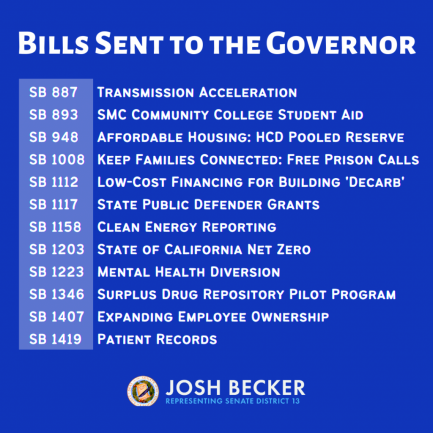MENLO PARK – Bold plans to speed clean energy action, waive fees for more San Mateo County community college students, and create a regional pharmacy using surplus meds to fill free prescriptions for the indigent are among the bills by Senator Josh Becker now heading to Governor Newsom for review.
The Legislature passed 12 bills by the Peninsula Democrat in the final days of the state’s 2021-2022 legislative session, which adjourned early Thursday.
“I’m grateful the strong support from my legislative colleagues from both houses and thank the many community members whose engagement and advocacy helped get my bills to the Governor’s desk,” said Senator Becker.
Climate Action
The Governor and the Senate’s Climate Working Group proposed major measures this year to meet the urgent challenges of climate change, reduce California’s reliance on fossil fuels, make the grid more reliable, speed the transition to 100% clean energy, and make it possible for everyone to benefit from the transformation.
Three of Senator Becker’s bills – Senate Bill 1203, SB 1158 and SB 887 – are among the 12 in the working group’s Climate Package. All three bills and SB 1112, also by Senator Becker, passed.
State of California Net Zero Operations: Senate Bill 1203 sets a target for all state agencies to achieve net zero greenhouse gas emissions by 2035, effectively requiring the state to lead the transition to the clean energy future by example.
Clean Energy Reporting: SB 1158 improves the way retail electricity suppliers report critical information. This would provide California with a more accurate picture of when the grid runs on clean energy, when it uses fossil fuels, and how much. The data will help California manage its progress toward clean energy goals.
Transmission Acceleration: SB 887 will help California swiftly build the transmission needed to deliver the enormous amount of new clean energy resources that will enable our state to achieve its goal for zero-carbon electricity by 2045.
Low-Cost Financing for Building Decarbonization: SB 1112 supports equitable financing so more people can afford to decarbonize their homes and buildings. Eliminating the large up-front costs homeowners face in making their property more energy efficient and allowing them to pay over time would be big improvements. SB 1112’s goal is to make this possible.
Social Justice
The Keep Families Connected Act: SB 1008 makes phone calls free for people incarcerated in California prisons and detained youths The bill eliminates the burdensome fees that typically drove 1 in 3 families who tried to keep in contact with incarcerated love ones into debt, according to data compiled before the pandemic. Those fees, shouldered predominantly by families of color led by women, fuel a $1.4 billion industry for the firms that provide prison telecom services in the US. Studies show that incarcerated people who keep in contact with their loved ones are more successful in their return to society than those who do not.
Grantmaking by the Office of the State Public Defender: SB 1117 provides authority to the Office of the State Public Defender to issue grant awards, if allocated, to the most innovative public defender offices and programs across the state.
Economic Equity and Education
The California Employee Ownership Act: SB 1407 creates a hub within the Governor’s Office of Business and Economic Development, better known as GO-Biz, to focus on helping workers, business owners and other stakeholders learn about employee ownership and navigate resources to smooth the path for transition. Small businesses, the backbone of the economy, are being hit by the “silver tsunami” of owners who are at or near retirement age with no succession plan for their businesses. At the same time, fewer and fewer workers can save for emergencies, let alone their own retirement. Transitioning to an employee-owned model can address both problems by enabling businesses to carry on with workers taking the reins, a change proven to build prosperity for all involved.
The San Mateo County Community College District Pilot Program: SB 893 would enable SMCCCD to expand aid to underrepresented and marginalized community members in San Mateo County without incurring more costs to the state. The bill allows the district to use their existing local revenues for fee waivers, which in turn would reduce the total cost of attendance for students eligible for the pilot program.
Affordable Housing
The Housing and Community Development Pooled Reserve: SB 948 cuts costs for affordable housing projects in California by shifting the responsibility to hold a “transition reserve” from the project level to a pooled reserve operated by the state's Housing and Community Development Department. The switch would free up significant affordable housing resources that are currently locked away in project-specific reserves. Instead, the money would be used to produce additional units of affordable housing, or deepen the affordability of units.
Patient Care
Surplus Drug Repository Pilot Program: SB 1346 would establish a regional pilot program in Santa Clara, San Mateo and San Francisco counties to ensure that unopened medications are made available to patients in financial need to fulfill prescriptions the patients would be hard-pressed – if not unable – to afford. Nationwide, more than $5 billion worth of unused medications are thrown out by hospitals and long-term care facilities each year, even though the high cost of pharmaceuticals forces nearly 1 in 4 Americans to skip doses or forgo filling prescriptions. In California, millions of dollars’ worth of surplus meds go to waste annually.
Medical Patient Records: SB 1419 provides new protections to ensure patients receive sensitive information about their clinical laboratory tests and imaging scans in the manner that works best for them. The California Medical Association is sponsoring SB 1419.
The deadline for Governor Newsom to sign or veto bills is September 30.
###
Media Contact: Leslie Guevarra, leslie.guevarra@sen.ca.gov, 415-298-3404
